Your search for 'front'
returned
572 results.
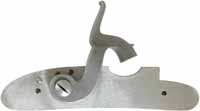
|
S. Hawken , right hand, percussion lock, notched for breechplug, by L&R
We offer our Thomas Gibbons style S. Hawken cap lock pre-notched for our #Plug-LR-16-3 breech plug and tang. On receipt of this lock, plug, and tang, you will notice that the notch is about .010” too shallow at the bottom, not bad for an “as cast” fit. Two or three swipes with the rounded side of a fine cut file will provide the needed clearance at
|
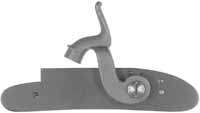
|
S. Hawken left hand, percussion lock, by L&R
Sam Hawken and other makers used these locks on Plains rifles, Ohio rifles and late longrifles, during the later percussion era of 1845 to 1885. Thomas Gibbons of St. Louis made and signed many locks. Note the square inside corner at the front of the lock plate, and the normal narrow percussion hammer, both late features. Fitted with a fly detent f
|
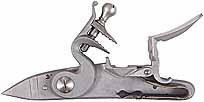
|
American Classic longrifle flint lock , right hand, by L&R
American Classic longrifle flint lock, right hand, by L&R New competition for the Siler lock, L&R’s new “Germanic” lock is for use on classic American longrifles of the 1760-1800 era. It is made to fit large Siler lock mortise. The cam action angle of the tumbler engages the mainspring. This really speeds lock time. Turned bearing surfaces on th
|
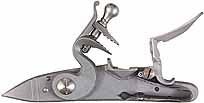
|
American Early Classic longrifle flint lock, no pan bridle, right hand, by L&R
American Early Classic right longrifle Flint Lock, by L&R New competition for the Siler lock, L&R’s new “Germanic” lock is for use on classic American longrifles of the 1760-1800 era. It is made to fit large Siler lock mortise. The cam action angle of the tumbler engages the mainspring. This really speeds lock time. Turned bearing surfaces on th
|
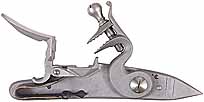
|
American Classic left longrifle Flint Lock, by L&R
American Classic left longrifle Flint Lock, by L&R New competition for the Siler lock, L&R’s new “Germanic” lock is for use on classic American longrifles of the 1760-1800 era. It is made to fit large Siler lock mortise. The cam action angle of the tumbler engages the mainspring. This really speeds lock time. Turned bearing surfaces on the tumbl
|
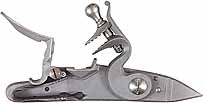
|
American Early Classic left longrifle Flint Lock, by L&R
American Early Classic left longrifle Flint Lock, by L&R New competition for the Siler lock, L&R’s new “Germanic” lock is for use on classic American longrifles of the 1760-1800 era. It is made to fit large Siler lock mortise. The cam action angle of the tumbler engages the mainspring. This really speeds lock time. Turned bearing surfaces on the
|
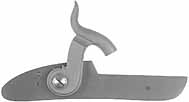
|
English Bar Lock right Percussion Lock, with early flat hammer, by L&R
English Bar right Percussion Lock, with early flat hammer The English “bar" lock is so-called because it uses a “drip bar" soldered to the barrel, instead of wood above the lock plate. This improvement eliminates wood in this critical area ahead of the nipple, where constant over-spray might char it. Most better London & Birmingham makers used
|
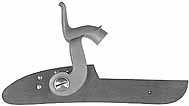
|
English Bar Lock right Percussion Lock, with Express hammer, by L&R
English Bar right Percussion Lock, with Express hammer The English “bar" lock is so-called because it uses a “drip bar" soldered to the barrel, instead of wood above the lock plate. This improvement eliminates wood in this critical area ahead of the nipple, where constant over-spray might char it. Most better London & Birmingham makers used “bar
|

|
H. E. Dimick - Saint Louis, right Percussion Lock, by L&R
H. E. Dimick - Saint Louis, right Percussion Lock Horace E. Dimick built plains rifles in Saint Louis, using English style bar locks. Most often he omitted the “drip bar”, and this lock is typical, with a rounded front end to be inlet flush into the lock panel. Polished bright inside, this lock features an abbreviated bolster, fly detent in the
|
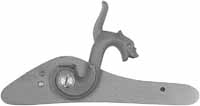
|
Schuetzen right hand, percussion lock, by L&R
A classic late Germanic style percussion lock, with smooth curves all around the lock plate. The front of the plate is long enough to allow using two lock bolts, although one lock bolt is more typical in this late percussion era. The hammer has a long throw to reach the nipple on nearly any hooked or solid patent breech. The highly styled gargoyle
|
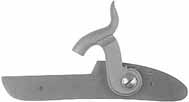
|
English Bar Lock left Percussion Lock, with early flat hammer, by L&R
English Bar left Percussion Lock, with early flat hammer The English “bar” lock is so-called because it uses a “drip bar” soldered to the barrel, instead of wood above the lock plate. This improvement eliminates wood in this critical area ahead of the nipple, where constant over-spray might char it. Most better London & Birmingham makers used “b
|
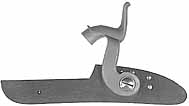
|
English Bar Lock left Percussion Lock, with Express hammer, by L&R
English Bar Lock left Percussion Lock, with Express hammer The English “bar” lock is so-called because it uses a “drip bar” soldered to the barrel, instead of wood above the lock plate. This improvement eliminates wood in this critical area ahead of the nipple, where constant over-spray might char it. Most better London & Birmingham makers used
|
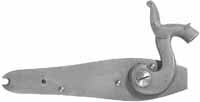
|
Lock, Back Action right hand, percussion, by L&R
Called “back action” because the mainspring hangs behind the tumbler, this lock was popular on percussion guns made in St. Louis, New York, California, Ohio, England and Belgium. Swivel breech double rifles require a back action lock mechanism. This lock can be modified for flint use. Side-by-side or over-and-under double rifles, shotguns, and comb
|
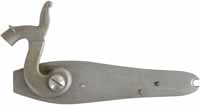
|
Lock, Back Action left hand, percussion, by L&R
Called “back action” because the mainspring hangs behind the tumbler, this lock was popular on percussion guns made in St. Louis, New York, California, Ohio, England and Belgium. Swivel breech double rifles require a back action lock mechanism. This lock can be modified for flint use. Side-by-side or over-and-under double rifles, shotguns, and comb
|
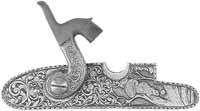
|
Ohio Squirrel Cap Lock , right hand, percussion lock, by R. E. Davis
This late percussion lock has engraving cast into the surface of the hammer and plate, decorated with ‘S’ and ‘C’ scrolls and leaves in classic style. The leaves open to a clearing at front, revealing a bushy tailed squirrel on the limbs of a tree. An example of American folk art circa 1853, from a rifle by O. B. VanDenBurgh, Findlay, Hancock Count
|

|
John Bivins' Muzzle Cap, wax cast, brass or steel
Wax cast to match our Bivins' tiggerguards and buttplates, in brass or steel. Radius on front edge, replicates an early formed end. Overall length of 1-5/16" with a 5/32" web thickness. Available for 13/16", 7/8", 15/16", or 1" octagon barrels.
|

|
Pattern for Women's Cloth Accessories, Pocket, Mob Cap, Bonnet, Kerchief & Shawl
Our pattern for 18th century Women's Cloth Accessories include an under apron or skirt pockets, kerchief, and circular mop hat with draw string. 18th century women wore one or two Pockets under their apron or skirt for carrying things. These oval bags are tied around the waist with a tape and the slit opening is accessible through openings in the s
|
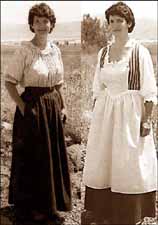
|
Pattern for Skirt, Petticoat, and Apron sizes 8 to 20
Our pattern for Skirt, Petticoat, and Apron includes detailed illustrated instructions for the construction of a skirt, petticoat, and apron, worn by women, during the 18th and 19th centuries. This pattern includes sizes 8 through 20. The kind of fabric, the amount of material in a Skirt or Petticoat and the kind of waistband used were indicati
|
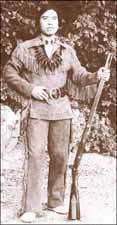
|
Pattern for a Early Frontiersman's Shirt sizes 36 to 50
This style depicts the style worn in the early 19th century. Not to be confused with our 'Frontiersman's Shirt', this early pattern was worn by fur trappers of the early 1800's. The shirt is slightly tailored but has the freedom of no sleeve cuffs or button closings. The Early Frontiersman's Shirt has a false yoke when front and back fringe is adde
|

|
Pattern for a Frontiersman's Shirt sizes 36 to 50
From an original in a private collection, this leather shirt may be made with or without fringe. It is a mid to late 1800's style with fringe and tailoring. Collar is two piece design, and cuffs are lined with calico. The front opening has a lacket and thong ties, and the shirt may be made with or without fringe. It may be decorated with beadwork,
|
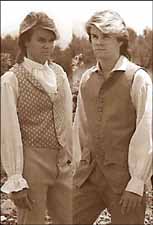
|
Pattern for a Waistcoat and Vest sizes 36 to 50
The 18th century Waistcoat was styled with a high neck and many buttons down the front. It was widely worn by both civilians, para-military outfits and the established military. Made of fine wool broadcloth or linen, and lined with fine linen or cotton, the waistcoat comes nine to ten inches below the waist. This pattern includes instructions for m
|
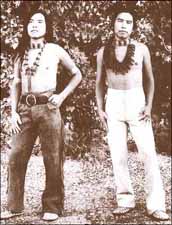
|
Pattern for a Early Frontiersman's Leather Pants sizes 30 to 42
Button front pants have flared legs, typical of those worn during the 1800's. Optional leg fringe, belt loops, and pockets are shown. Intermediate sizes are easily made and all instructions are illustrated. Made in the USA, published by Eagle View. All terms are fully defined in the handy glossary. Bold illustrated instructions make Eagle View patt
|

|
Pattern for Boy's Frontier Leather Pants size 4 to 14
Button front pants have flared legs, typical of those worn during the 1800's. Optional leg fringe, belt loops, and pockets are shown. Intermediate sizes are easily made and all instructions are illustrated. Made in the USA, published by Eagle View. All terms are fully defined in the handy glossary. Bold illustrated instructions make Eagle View patt
|
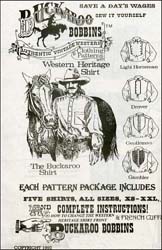
|
Pattern for Western Heritage Shirt , Buckaroo, Lt. Horseman, Drover, Gentleman, Gambler, sizes XS to 2X,L complete instructions
Make your own Western shirt. Choose from one of five different styles; Buckaroo, Light Horseman, Drover, Gentleman, and Gambler. Complete instructions, includes how to change the western heritage shirt front, and French cuffs. Order this nice pattern today! Suggested Fabrics to Use : Always use natural fiber fabrics for historical clothing! Buckar
|